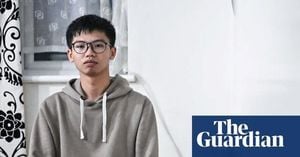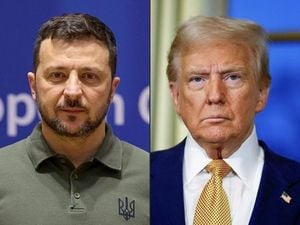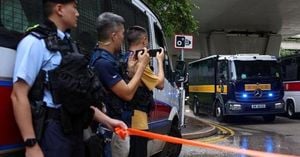On August 10, 2025, a flurry of political activity swept through Brazil, underscoring the country’s complex entanglements both at home and abroad. As Russian President Vladimir Putin reached out to Brazilian President Luiz Inácio Lula da Silva to discuss deepening cooperation among BRICS nations, the country’s domestic scene was rife with intrigue over the fate of former President Jair Bolsonaro, now under house arrest and at the center of an ongoing legal and political drama.
According to the Kremlin, Putin initiated the call with Lula to reaffirm their countries’ commitment to strengthening their strategic partnership and coordination within the BRICS bloc—a loose alliance of emerging economies that includes Brazil, Russia, India, China, and South Africa. The timing of the call was hardly coincidental. As reported by Bloomberg, Brazil has found itself in the crosshairs of U.S. President Donald Trump’s aggressive trade policy, with a hefty 50 percent tariff now slapped on Brazilian goods. The move has sent ripples through Brazil’s trade networks, prompting Lula’s government to look eastward for new economic opportunities.
During the conversation, Putin and Lula discussed not only the future of BRICS cooperation but also Putin’s recent talks with the United States regarding the ongoing conflict in Ukraine. Lula’s office confirmed that the two leaders touched on Brazil-Russia cooperation, signaling a shared interest in counterbalancing U.S. influence and diversifying partnerships. The renewed focus on BRICS comes as the group is increasingly energized by what many see as Washington’s protectionist turn.
In the wake of the U.S. tariffs, Brazil has been actively seeking to expand trade with China, India, and Southeast Asia. The government’s approach is measured—Lula has stated that Brazil will not retaliate against the U.S. with reciprocal tariffs, at least for now. Instead, he has floated the idea of a coordinated response with BRICS partners, gauging interest in a united front that could shift the balance of global trade. On August 7, 2025, Lula and Indian Prime Minister Narendra Modi held their own discussion, reinforcing the goal of expanding bilateral trade to more than $20 billion by 2030. This ambition is not just about numbers; it’s about asserting Brazil’s place in a changing world order.
But the impact of the U.S. tariffs is uneven. While Brazilian oil producers have found some relief, the country’s dependence on Russian diesel has become a point of concern—especially after Trump imposed additional tariffs on India for purchasing Russian energy. The interconnectedness of these issues highlights how global politics and economics are increasingly intertwined, with decisions in Washington, Moscow, or New Delhi reverberating through the streets of Brasília.
As Brazil juggles its international alliances, the political temperature at home remains high. On the same day as the Putin-Lula call, Supreme Federal Court (STF) Minister Alexandre de Moraes made headlines for his handling of former President Jair Bolsonaro’s house arrest. According to Folha de S.Paulo, Moraes denied a request by Federal Deputy Gustavo Gayer to visit Bolsonaro, citing Gayer’s involvement in a parallel investigation related to an alleged coup attempt. The minister’s decision was clear: those under investigation for similar charges would not be granted access to the former president during this sensitive period.
However, Moraes was not entirely inflexible. He authorized visits from four other deputies from Bolsonaro’s Liberal Party (PL) and from Deputy Governor of the Federal District, Celina Leão. Leão, who had been scheduled to visit Bolsonaro on August 8, 2025, but did not attend, was now cleared to make her visit on August 15. The careful calibration of who could and could not see the former president reflected the high stakes and ongoing scrutiny surrounding Bolsonaro’s legal situation.
In a move that drew both public attention and private relief for the Bolsonaro family, Moraes also approved visits from eight of Bolsonaro’s relatives on August 10, which coincided with Father’s Day in Brazil. The list of authorized visitors included Bolsonaro’s father-in-law Vicente de Paulo Reinaldo, mother-in-law Maisa Torres Antunes, daughter-in-law Fernanda Antunes, a granddaughter, two nephews, and a brother of the former first lady. According to O Globo, Moraes had previously decided that Bolsonaro’s children and grandchildren would not require prior authorization to visit, but the inclusion of additional family members was granted after a special request from the former president’s defense team.
The scene outside Bolsonaro’s residence was emblematic of the country’s ongoing political polarization. Supporters gathered to show solidarity, while critics pointed to the investigations as evidence of accountability finally catching up with the controversial ex-leader. The investigations themselves, centered on an alleged coup attempt, have cast a long shadow over Brazil’s political landscape, raising questions about the country’s democratic resilience and the rule of law.
Meanwhile, Lula’s government has sought to project stability and pragmatism, both in its foreign policy and its approach to domestic crises. The outreach to BRICS partners is as much about economic necessity as it is about geopolitical signaling. As reported by Bloomberg, Lula’s refusal to immediately retaliate against the U.S. tariffs, opting instead for dialogue and coalition-building, reflects a broader strategy to navigate turbulent global waters without burning bridges.
The dual storylines—Brazil’s shifting international alliances and the legal drama surrounding Bolsonaro—are deeply intertwined. Both underscore the challenges facing a country that is, in many ways, at a crossroads. The decisions made in the coming months, whether about trade, alliances, or justice, will shape Brazil’s trajectory for years to come.
For now, the only certainty is uncertainty. The world is watching as Brazil seeks to redefine its place on the global stage, all while grappling with the aftershocks of its own turbulent recent history. With BRICS partners extending a hand and the shadow of Trump’s tariffs looming large, the stakes could hardly be higher. And as Bolsonaro’s legal fate unfolds behind closed doors, the nation waits—sometimes anxiously, sometimes defiantly—to see what comes next.
In a nation where the personal and the political are often inseparable, the events of August 10, 2025, serve as a vivid reminder of just how much can change in a single day.




